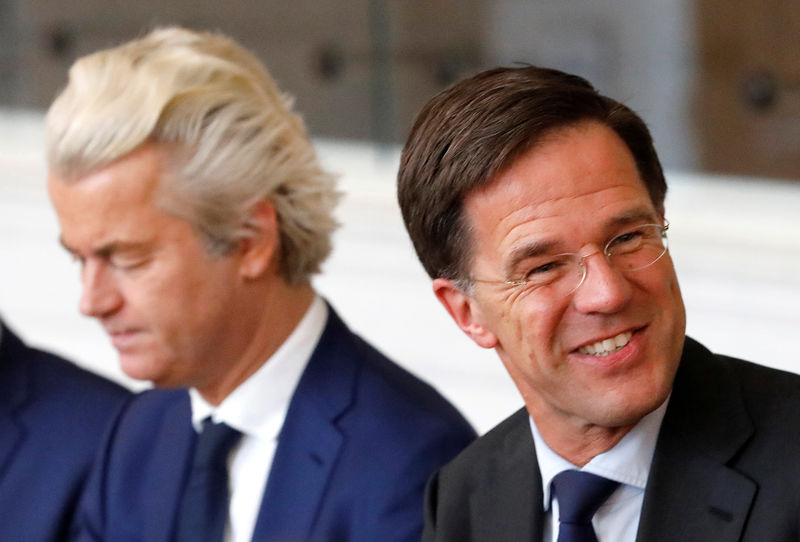By Anthony Deutsch and Thomas Escritt
AMSTERDAM (Reuters) - After fending off nationalist Geert Wilders at Monday's election, Dutch Prime Minister Mark Rutte must patch together a stable coalition that reflects the rise of fringe parties that made huge gains on the left and right.
The once tiny Green Left and 50Plus parties ate away at support for the mainstream parties. They will have to be considered by Rutte's centre-right VVD, which lost ground but remains the largest party with 33 seats, as it seeks a majority of at least 76 in the 150-seat house.
The process cannot formally begin until Rutte's VVD has been asked to head formation talks and preliminary election results have been declared official by the Electoral Council on Tuesday, and could take weeks or months.
Talks could drag on until after the summer as parties dig in their heels on their policy red lines, according to NRC newspaper commentator Tom-Jan Meeus.
"Because we have a budget surplus now there is no rush to set up a coalition," he said.
Signing up to a coalition is not without its risks, as the Labour party of Finance Minister Jeroen Dijsselbloem found out. Rutte's partner of the past four years was almost wiped out, tumbling from 38 to 9 seats, punished by voters for backing Rutte's austerity programme.
The consensual traditions of the Dutch proportional system dictate that the largest party leads talks and the parties which gained most ground must be seriously considered.
Wilders' Party for Freedom, which rose to second place with 20 seats, has been ruled out by all the major parties, for whom policies like quitting the European Union, closing the border to Muslim immigrants and banning the Koran are anathema.
Labour will likely be replaced as junior partner by the Christian Democrats and the progressive centrist Democrats 66, which would leave Rutte five short of a majority.
The highly fragmented field, with 13 parties in the new parliament, gives Rutte plenty of options - but each brings its own difficult policy compromises.
In coming days, Edith Schippers, the health minister chosen by Rutte's party to lead exploratory talks, will consult with all winning parties, ranging from Wilders's anti-Muslim party to Denk, which aims to represent Dutch Muslims.
On the fringes are likes of the Party for the Animals, whose environmentalist, animal-rights message won it 328,000 votes and five seats, must also be consulted.
On one issue, there is relative unity: with Wilders all but certain to play no role in the next government, nearly all parties are broadly supportive of the European Union.
STICKING POINTS
Some of the key issues:
Immigration and duel citizenship:
Rutte's VVD pledged to carry on tightening immgration controls during a campaign dominated by questions of identity. But the Greens want to do the opposite, restoring the country's reputation as a haven of tolerance by accepting refugees.
The Christian Democrats (CDA) want to do away with dual nationality to force immigrants to integrate, a measure opposed by several other parties.
Pensions, retirement, elderly care:
As part of a punishing austerity programme, Rutte's government cut spending on elderly care and raised the retirement age from 65 to 67. 50Plus, the pensioners' party, wants to undo these changes.
Energy, climate and fossil fuel:
Rutte cut spending on fighting climate change and on renewable energy and opened new coal-fired power plants. The Greens want to close them and channel an extra 8 billion euros into renewables.
Healthcare and elderly benefits:
Rutte's government introduced a compulsory "own contribution" to healthcare costs, before insurance coverage kicks in. In 2016 and 2017, it was set at 385 euros a year. The Greens and 50Plus want to abolish it.
Taxation:
Rutte and the Christian Democrats want to lower taxes, while the Greens want to introduce a pollution tax and increase the rate of social security contributions for people with an annual income above 150,000 euros by 10 percentage points to 17.5 percent.
Euthanasia and medical ethics: D66, for decades the champion of progressive reforms from drugs decriminalisation to equal marriage, called for euthanasia to be an option for people who were not ill but who merely felt that their life was "complete". The Christian Democrats and two smaller, more radical Christian parties, strongly oppose this measure.

(This version of the story corrects name to Tom-Jan Meeus in para 4)